Utilizing email as part of your marketing strategy can effectively promote a business’s products and services while nurturing customer loyalty. Email marketing serves as a means to inform subscribers about new offerings, discounts, and additional services.
Moreover, it provides an opportunity for a softer approach, enabling businesses to educate their audience about brand value or maintain engagement between purchases.
Email marketing stands out as one of the most widely used and impactful tools for marketing endeavors aimed at brand growth or sales. This article delves into the benefits of email marketing, particularly the use of promotional emails, and how they can contribute to business expansion.
Benefits of Email Marketing:
Email marketing proves advantageous for businesses as it prompts recipients to take action; an email remains in the inbox until read, deleted, or archived. Additionally, it is a cost-effective tool, offering significant returns on investment.
Moreover, email marketing fosters audience engagement by directing traffic to various platforms like blogs, social media, or other preferred destinations. Through segmentation, businesses can target specific demographics, ensuring recipients receive tailored messages that cater to their interests.
Furthermore, email marketing facilitates A/B testing of subject lines or calls to action, allowing businesses to optimize message performance using specialized software.
Tips for Building an Email Marketing List:
Building an audience for email marketing entails ethical practices and customer-centric approaches. Avoid purchasing email lists, as reputable email marketing companies enforce permission-based policies.
Instead, focus on encouraging opt-ins through lead magnets, such as offering discounts or free shipping upon subscription. Compliance with national and international email regulations, such as the CAN-SPAM Act in the United States or GDPR in the European Union, is imperative.
Businesses must adhere to legal requirements governing email communications to protect subscriber privacy and avoid legal repercussions. Moreover, email serves as a platform for meaningful communication beyond marketing promotions.
Businesses can engage with customers through surveys, appreciation messages, follow-ups on abandoned carts, or simple greetings, fostering a deeper connection and soliciting valuable feedback.
Finally, businesses should exercise discretion in email frequency, prioritizing relevant and engaging content over excessive communication. Respect for subscribers’ preferences and interests maintains their trust and loyalty over time.
By adhering to ethical practices and leveraging the power of email marketing, businesses can effectively engage their audience, drive conversions, and foster long-term relationships with customers.
Simple Email Marketing Tips to Kickstart Your Campaign
- Develop a Clear Plan :
Before diving into email marketing, it’s crucial to lay out a plan. To simplify this process, we’ve outlined some top tips to consider when crafting your email marketing strategy.
- Understand Your Audience :
Knowing your audience is key to effective communication. Regardless of what you offer, having a solid grasp of your audience allows for personalized and targeted emails. With tools like Mailchimp, segmenting users within your audience becomes easier, leading to increased engagement, trust-building, and improved ROI.
- Analyze Signup Sources :
Valuable insights lie within your signup form data. Understanding how and where subscribers join your list provides invaluable information on how to tailor your communication and focus your marketing efforts effectively.
- Utilize Segments and Groups:
Once you’ve identified smaller subsets within your audience, creating groups and segments allows for more personalized emails. By leveraging segmentation tools, such as those offered by Mailchimp, you can significantly boost click-through rates and e-commerce orders.
- Craft Meaningful Content
With a clear understanding of your audience, it’s time to consider your content. What message do you want to convey? Ensure your emails have purpose and resonate with your subscribers, aligning with their interests and reasons for subscribing.
- Determine Frequency and Objectives
Finding the right balance in email frequency is essential. While there’s no one-size-fits-all approach, bombarding subscribers can lead to disengagement. Consider your content type, industry norms, and subscriber preferences when deciding on sending frequency.
- Establish a Schedule
Maintaining consistency is key to success. Creating a content calendar allows you to organize campaigns, blog posts, and social media updates effectively. Tailor your schedule to your industry, content strategy, and desired frequency to keep your audience engaged and excited about your emails.
By implementing these straightforward tips, you can kickstart your email marketing campaign with confidence, connecting with your audience in a meaningful way while driving results for your business.































